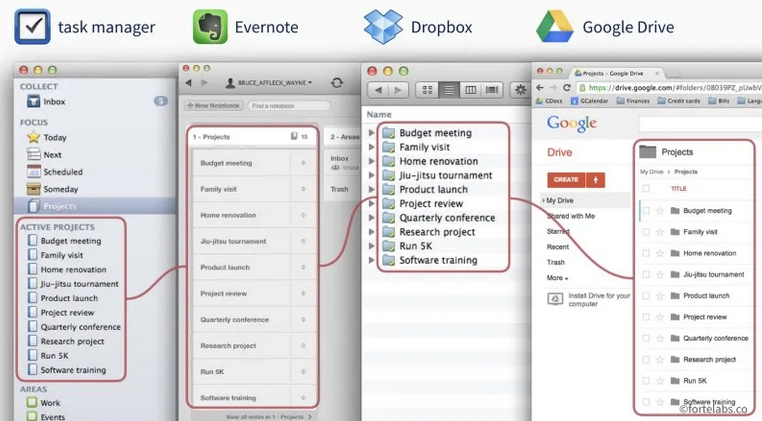P.A.R.A.
Tasks without context won’t help you achieve big things, so every task should serve their purpose: as part of a project, or part of a responsibility.
PARA is a system created by Tiago Forte, created to organize digital information.
- Projects: “A series of tasks linked to a goal, with a deadline”
- Area: “A sphere of activity with a standard to be maintained over time”
- Resouces: “A topic or theme of ongoing interest”
- Archive: “Inactive items from the other three categories”
PARA have some great ideas that I implement in my own task and knowledge management:
# Every task should be in a project or resopnsibility
PARA create a distiction between Projects and Area (or responsibility), because task will emerge from each, but with a very different output or impact. Tasks from a responsibility usually is recurring, and mostly ’endless’, meaning there will be no end of it as long as you have the responsibility related to it. Task from a project on the other hand, should have an end point, which is the end of the project. If we don’t differentiate those two, progress of projects are slow because usually not as urgent as tasks from responsibilities.
Several guidelines that I use to handle task:
- If a task is related to a responsibility, it will probably comes up again someday in the future, so it is ideal for us to create a ’template’, Standard Operating Procedure, or some kind of automation to make finishing the task easier or faster. This also allows us to delegate the task to our team member that serve the same responsibility.
- If a task is related to a project, we should somehow associate the task to that project (by using tags, folder, etc), so we can gather all information regarding the project in one place so we won’t miss a thing. This is also improtant to align the align the output of the task with your project goal.
# Every Project Should be supporting a clear Goal
Every Project should live inside an Area, but what makes them different with other tasks in an Area is that Project should have a short term goal, and usually related with improvement. An interesting exercise from the author is to make a Goal List and a Project List, and make connection between those two:
- Project without goal is a hobby, or a nice to have, because you are not really commited or the project is not really adding any value to your life.
- Goal without a project is ia dream, because you don’t have anything planned to achieve the goal.
# Have a consistent foldering/naming system across all your tools
PARA advise you to have the same folder structure between tools/platform, so you can have consistency in managing tasks and projects. This will be very important if you manage multiple projects at the same time.



